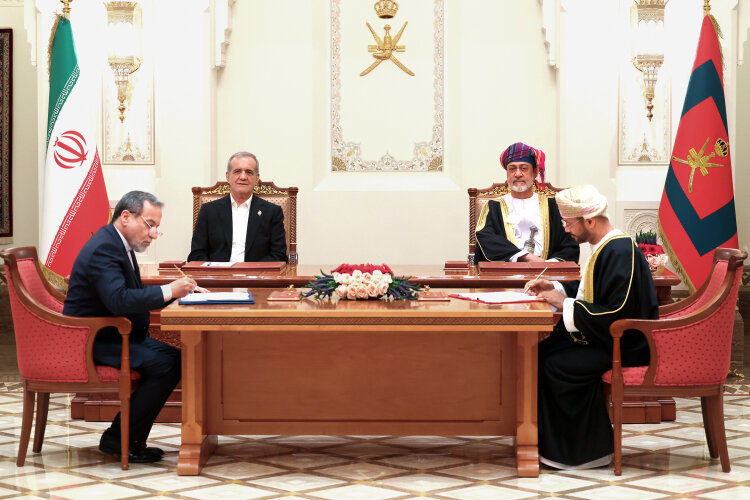Iran and Oman strengthen ties with high-level visit and 18 new agreements

TEHRAN - Two historically close Persian Gulf nations marked what could be the beginning of an even closer state of ties on Tuesday, as President Masoud Pezeshkian of Iran embarked on a high-ranking trip to Muscat, Oman.
Upon arrival, Pezeshkian and his accompanying delegation were received by Sayyid Shihab bin Tarik al Said, Deputy Prime Minister for Defense Affairs, at the Royal Airport. Foreign Minister Abbas Araghchi was among several ministers accompanying the president. Later, Pezeshkian was welcomed by Sultan Haitham bin Tarik at an official reception ceremony.
In a meeting with the Sultan, Pezeshkian expressed gratitude to Oman for its role in facilitating the ongoing indirect talks between Iran and the United States. Oman has been hosting the negotiations and serving as the go-between.
“We appreciate the good efforts of our friendly and brotherly country, Oman, in mediating in the negotiations and hope this process leads to good results.” He underscored Oman’s strategic importance in Iran’s foreign policy, adding, “The Islamic Republic of Iran has complete trust in Oman; this trust increases both parties’ responsibility to strengthen relations and pursue more substantial agreements.” The U.S. had sought the UAE to act as the mediator. Iran, however, said it wants Oman to take on the role.
Elsewhere in his remarks, Pezeshkian expressed Iran’s readiness to expand collaboration with Oman in multiple fields, including financial, scientific, educational, technological, and particularly medical areas. Emphasizing the shared responsibilities of Muslim nations, he said, “We are prepared to do whatever we can for the dignity and greatness of Muslims. Each of us has capacities that we can utilize for the welfare and progress of each other and other nations in the region; under such circumstances, no foreign power will be able to bring Muslim nations under its dominance.”
He also thanked Oman for its clear and supportive stance on the plight of the Palestinian people, especially regarding the situation in Gaza. “We sincerely thank you for your good positions regarding the Gaza issue and support for the oppressed.”
Highlighting the importance of sustainable development beyond natural resources, the president noted, “Although oil and gas are divine blessings, they are not unlimited. It is necessary for the traders and industrialists of both countries to plan for future generations and strengthen long-term economic foundations.” He called for facilitating economic exchanges, promoting trade, and expanding cooperation in defense and security.
For his part, Sultan Haitham bin Tarik expressed optimism about the future of bilateral relations. “By God's grace, today Oman is in a good position without dependency on oil and gas and with a focus on strengthening trade exchanges,” he said.
The Sultan agreed on the need to boost trade by improving access for traders and developing links between Iranian and Omani ports. He also highlighted the significance of Iran’s north-south railway for enhancing regional trade.
Addressing security ties, Sultan Haitham emphasized Oman’s commitment to supporting Iran’s success, viewing it as beneficial for the entire region. “More support should be provided for energy cooperation between the two countries, and we welcome any collaboration with Iran, especially in military fields and mutual interests,” he added.
He expressed gratitude for the trust placed in Oman by the Leader of the Islamic Revolution, Ayatollah Seyyed Ali Khamenei, in the mediation process, assuring that Oman acts with purely benevolent intentions. “Rest assured that the positions conveyed by you to us will be given full attention and respect.”
On the Palestinian issue, Sultan Haitham praised Iran’s principled defense of Palestinian rights, stating, “Standing firm on the rights of the Palestinian people and defending oppressed citizens is valuable and commendable for us.”
The discussions led to the signing of 18 cooperation agreements, which aim to strengthen the ties between the two countries across various sectors, including legal, economic, political, cultural, educational, health, defense, media, technology, energy, and mining.
Leave a Comment